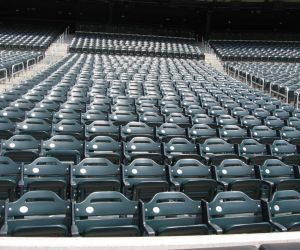The Silence of the Fans

The ball whizzes past. It’s hard to hear unless you’re playing, but the rotating seams on baseballs cutting through the air at eighty to a hundred miles an hour make noise. The first few times you hear it scares you silly. Once the fear leaves, all you really want to do is make the ball you throw emit the same terrifying zipping noise. Living at the 99th percentile of overhand throwing humans is a powerful - and non-permanent - endowment. If you can harness it, you can make millions. You can also blow your arm and shoulder apart, and live the rest of your days reaching for the milk jug with your non-dominant limb. But … in the moment … you are the lightning hurling embodiment of Zeus.
It was a brief, pre-school / work conversation, but the Malin boys chatted about what it must have been like to be at the Orioles / White Sox game without the fans. The sounds of the game are special to ballplayers, and playing the game for the game’s sake, without the sonic interference of Jumbotrons, beer vendors and hecklers must have been remarkable. The zip of the ball. The crack of the bat. The scratch of cleats. The creak of the umpire’s knees. The belching in the dugout. It must have been splendid, except for knowing the unrest outside was quelled only under the hammer of military capable force.
If you ask a youth baseball coach what they’d like most, most would say more pitching. If you asked them what they’d like second most, most would say parents who can shut up. The kids are ballplayers, and they’re all terrific. Most of the parents are too, but there are some …
I was once watching my son’s team beat a visiting club by such a wide margin it was no longer enjoyable. In the first game of the double-header one of their players did not execute a bunt properly and was drilled square in the face with a fastball. It was horrific, and the four minutes of waiting for the EMTs to take him to the hospital were gut-wrenching. The game went on, because it does. In the second game the other team had run out of pitching and were walking runners across the plate toward a “mercy-rule” finish. It was raining, their face-struck batter was still at the hospital, they had no chance and a long bus ride home. Their pitcher threw a strike and some parent on our team shouted “he can’t throw two more!”.
I don’t recall the outcome of that at-bat. It doesn’t matter. Our boys won both games on the field but we lost what really mattered – our caring, our decency and our collective reputation. You can bet that team told everyone how awful we all were, because some over-competitive knucklehead mouthed off. I always tried to address this behavior head-on when I managed teams by making my expectations clear. A season starting note to parents follows:
“A note as our season starts…
Sometime in late June or early July, our season will be over. We’ll have played 30 – 35 games, and hopefully have won the last three, in addition to a bunch of others along the way. We’ll have a season-ending celebration, and some of our boys will go on to All-Stars, some will continue their high school seasons and some will hang up their cleats until they play softball later in their lives. Our 13-year-olds will return for fall ball, and pass on East Pony and team traditions.
Part of the charm of baseball is every game contains hundreds of small dramas; pitchers facing hitters, baserunners testing fielders, a long fly ball against a stiff south wind, managers plotting against each other...
I don’t pretend to know how each of those hundreds of small dramas will play out in any single game.
But I know two things for certain.
I know each of our ballplayers will try their best. Not one of them wants to make an error, or walk a batter, or strike out. I’ve promised them they’ll never have a coach give them trouble for anything except a lack of hustle, or other evidence of disrespect for the game, or team. I’ll ask that you do likewise, and be 100% positive during the games. Baseball looks much easier from the spectator side of the fence than it actually is, and we don’t need a single negative comment coming through the chain link – even if directed at the umpire or other team.
Having been at this for eight years, the one thing I am most certain of is the time our boys play together on the field is a piece of magic. Boys, becoming young men, facing challenges and working together, while playing a difficult game.
If I have one piece of advice … it is … enjoy the magic. July will get here soon enough. And though you’ll think you’re weary of cold nights and hot days at Garfield Park then, years from now you’ll wish you could spin the clock backward, to that time your son and his eleven teammates were a determined but happy band of ballplayers, playing the national pastime for no other reason than they love it.
Enjoy the show.”
Life can be hard. Baltimore hard. But just a suggestion, as it whizzes by like a fastball. Don’t be that guy shouting “he can’t throw two more!”.

